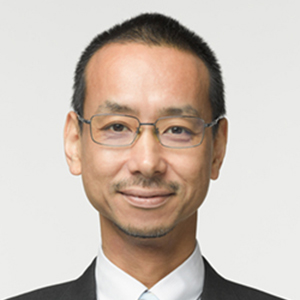Materials informatics (MI) is to develop or study materials with the aid of informatics or machine learning. A typical approach involves training a black box model that relates basic descriptors (structure, composition, etc) and figure-of-merit (target properties) and predict or design a material with the best or improved performance. At Thermal Energy Engineering Lab (TEEL) at the University of Tokyo, together with the collaborators, we have been working on MI for heat transfer since 2015.
One of our early works was to design binary multilayered nanostructures to either minimize or maximize thermal conductance by coupling thermal transport calculation and Bayesian optimization, which showed excellent efficiency.

Junichiro Shiomi,
University of Tokyo (UTokyo)
Later, the search space has been greatly expanded by utilizing quantum annealing. We have applied the methodologies to computationally design and experimentally realize aperiodic superlattices that optimally impede coherent thermal transport, as well as multilayer metamaterials that exhibit wavelength-selective thermal radiation.
More recently, we have extended the machine learning approach to polymers, with the aim of enhancing their thermal and dielectric properties. When molding or compounding polymers, the final properties are quite sensitive to the process parameters, and the approach of serially connecting optimal design and experimental realization of materials is insufficient. To this end, we have been developing experiment-in-the-loop MI methods, where experimental fabrication and measurement are included in the optimization loop. This has enabled us to efficiently enhance the polymer composite properties. Furthermore, the loop is accelerated and expanded by automating the system with robotics. The automation of material processing and property measurements helps generate massive data, expanding the capability of machine learning, including the use of generative AI.
In the talk, I will introduce our series of works on MI for complex materials at TEEL and discuss both the practical and conceptual challenges associated with this research.
Junichiro Shiomi is Professor in the Institute of Engineering Innovation and Department of Mechanical Engineering, School of Engineering, the University of Tokyo (UTokyo). He received B.E. (1999) from Tohoku University, and Ph. D. (2004) from Royal Institute of Technology (KTH), Sweden.
Leading the Thermal Energy Engineering Lab, he has been pursuing research to advance thermal management, waste heat recovery, and energy harvesting technologies based on nano-to-macro innovation in materials, structures, and systems.
Prof. Shiomi is Fellow of Japan Society of Mechanical Engineers, Member of Science Council of Japan, and Member of Engineering Academy of Japan. He serves as an Associate Editor of Nanoscale and Microscale Thermophysical Engineering. He is a recipient of the Zeldovich Medal from the Committee on Space Research, the Commendation for Science and Technology by the Minister of Educational, Culture, Sports, Science and Technology (the Young Scientists’ Prize and the Science and Technology Prize), the Academic award of Heat Transfer Society of Japan, the Academic Award of Thermoelectric Society of Japan, the JSPS Award, and the Nukiyama Memorial Award.